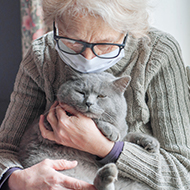
Annual report shows the vital support that pets provide during pandemic
Findings from the annual PDSA Animal Wellbeing (PAW) Report have shown that pets will be the only companion for millions of people this Christmas.
The PAW Report is produced in collaboration with YouGov and has tracked pet wellbeing in the UK for the last decade. It states that 2.8 million UK pet owners live in a single-person household.
Many of these owners are often elderly or vulnerable – both groups which are already at risk of facing isolation at Christmas. But with stricter COVID-19 restrictions still in place in many parts of the country, the likelihood of millions spending Christmas alone is increased.
Research published in the PAW Report also showed that 54 per cent of dog owners and 45 per cent of cat owners said that their pet had been a lifeline for them during lockdown. 18 million pet owners said that their pet makes them feel less lonely and helps to improve their mental health.
PDSA is concerned that the financial impact of the COVID-19 pandemic will result in more people being unable to afford pet care across Christmas. The PAW Report states that 1.2 million UK pet owners stated they were more likely to register for veterinary care from charities during lockdown, if they became eligible.
For this reason PDSA is asking for help in supporting it's Pet Care Crisis Emergency Appeal, which aims to raise vital funds to help the charity continue treating animals across what will certainly be a difficult winter.
Sean Wensley, a senior veterinary surgeon for PDSA, said: “We know that pets make many owners feel mentally healthier, but the PAW Report findings also demonstrate how vulnerable many pet owners are when their financial circumstances change and their pet needs emergency treatment.
“PDSA is the safety net there to support the UK’s most vulnerable pets and their owners who love them dearly. The wellbeing of hundreds of thousands depend on our ability to help during times of crisis.”



 The Veterinary Medicines Directorate (VMD) is inviting applications from veterinary students to attend a one-week extramural studies (EMS) placement in July 2026.
The Veterinary Medicines Directorate (VMD) is inviting applications from veterinary students to attend a one-week extramural studies (EMS) placement in July 2026.